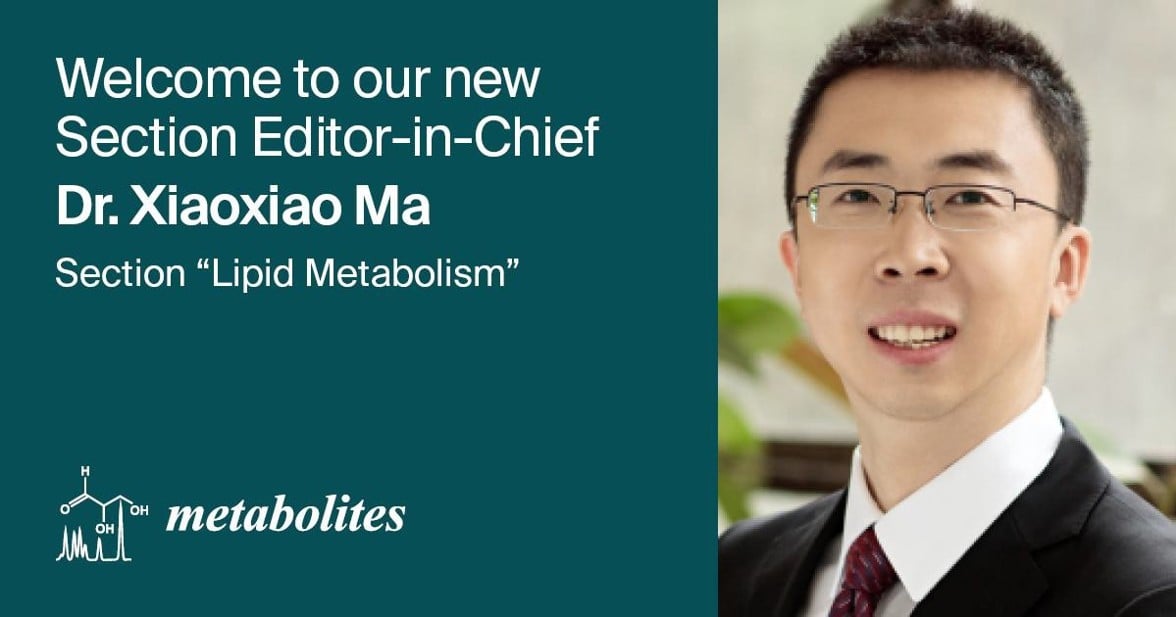
Dr. Xiaoxiao Ma Appointed Section Editor-in-Chief of Section “Lipid Metabolism” in Metabolites
We are pleased to announce the appointment of Dr. Xiaoxiao Ma as the new Section Editor-in-Chief of the Section “Lipid Metabolism” in Metabolites (ISSN: 2218-1989).
Dr. Xiaoxiao Ma is an Associate Professor at the Department of Precision Instrument, Tsinghua University. He also serves as the Deputy Director of the State Key Laboratory of Precision Measurement Technology and Instruments and is a committee member of the Mass Spectrometry Branch and Medical Mass Spectrometry Branch of the Chinese Society for Analytical Chemistry.
His research focuses on mass spectrometry instrumentation and its biomedical applications, with an emphasis on high-throughput, high-coverage structural annotation technologies for lipidomics at the single-cell and tissue levels. He has published over 60 papers and serves as an Editorial Board Member for multiple journals, including Chinese Chemical Letters and Health and Metabolism.
His accolades include being selected for the National High-Level Youth Talent Program and the list of the World’s Top 2% Scientists. In 2025, he received the American Chemical Society’s Early Career Investigator Award.
The following is a short Q&A with Dr. Xiaoxiao Ma, who shared his vision for the journal with us, as well as his views on the research area.
1. What appealed to you about the journal that made you want to take on the role as its Section Editor-in-Chief?
Metabolites is a comprehensive journal dedicated to metabolism and metabolite analysis. Having been engaged in research on lipid analysis technologies and their biological applications for the past decade, I was honored to be offered the position of Section Editor-in-Chief by the journal. This role aligns perfectly with my background and presents an exceptional platform and opportunity to advance and promote lipid analysis technology, lipid metabolism, biomedical applications, and clinical research.
2. What is your vision for the journal?
The journal is poised to attract scholars from diverse fields of lipids, including fundamental research, applied studies, and methodology. It serves as a premier venue for publishing the latest technological advancements. Furthermore, by leveraging the resources of MDPI, I will collaborate with the journal to organize workshops, publish Special Issues, and establish awards, thereby fostering communication among scholars and driving the development of lipid research.
3. What does the future of this field of research look like?
In recent years, lipid research has shown an accelerating trend, with significant advancements emerging in both methodological studies and fundamental biology. Key areas or concepts of focus include, for instance, ferroptosis, tumor plasticity, lipotype, and development of lipid atlases for various cell types and organisms. From an omics perspective, lipidomics, as the final piece of the omics puzzle, is poised to work in concert with other omics technologies to collectively drive the advancement of basic life sciences. Looking ahead, we anticipate a surge in more significant fundamental and applied lipidomics research. This progress will be paralleled by increased third-party analytical services and commercial products tailored for lipid analysis.
4. What do you think of the development of open access in the publishing field?
I believe the development of open access is a profoundly positive and necessary evolution for scholarly publishing. This accelerates innovation, as discoveries and new methods can be reached openly and immediately, which is vital for fast-paced fields like analytical chemistry and metabolomics.
We wish Dr. Xiaoxiao Ma every success in his new position, and we look forward to seeing his contributions to the journal.
